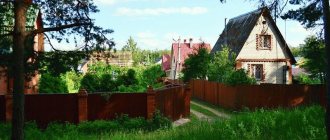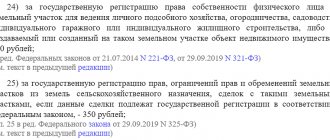In August 2021, the State Duma adopted a law extending the so-called “Dacha Amnesty.” It is now possible to register a land plot as personal property under the dacha amnesty until March 1, 2026.
The dacha amnesty is a law on a simplified form of privatization of garden plots and buildings on them. That is, the transfer of land from municipal (rural, urban) property to private property, as well as a simplified procedure for registering buildings. The need for privatization is explained by the fact that until 2000, plots were allocated to summer residents without paperwork - the owner simply received a garden book.
At the same time, he had the right of use or lifelong ownership. The owner of the dacha could not dispose of this land in any way (sell, donate). Since 2006, thanks to the dacha amnesty, it has become possible to register ownership of a dacha plot and house free of charge and using a simplified procedure.
Who has the right to privatize land?
Privatization of a land plot in SNT is available to all title owners of land who have received a plot for a dacha on the basis of :
- rent from the municipality;
- lifelong inheritable ownership;
- permanent (unlimited) use.
In this case, an important rule is the primacy of the gratuitous re-registration of land ownership by a person who has not previously used such a chance.
If the owner of a dacha has previously privatized land of any category, he is excluded from the privatization process . For him, only the right to purchase the land plot at the cadastral value remains relevant.
There are 3 ways to find out the cadastral value of a property. Step-by-step instructions are described in the article.
What is required to register property rights?
To privatize a land plot, you need membership in a dacha cooperative , with an allocated share in the joint title right, officially registered in the board of a non-profit society (NPO). These can be both designated dacha settlements SNT and their varieties such as DNT and DNP. There are no significant differences between them in the principles of land privatization, and the procedure fits into a standard algorithm.
If the plots are leased by a cooperative that has decided to begin privatization, the process is made easier for plot owners by the fact that the main issues will have to be resolved by the SNT board. The founder will need to obtain a decision from the general meeting, which acts as a legal authority. The procedure for privatizing a leased land plot is described in detail right here.
When the dacha cooperative has registered ownership of most of the lands, and some dacha owners have delayed the procedure, they will have to complete the documentation themselves. They will also need to obtain permission for privatization from a majority vote of the cooperative members present at the general meeting.
Possible interference
The list of common obstacles to the privatization of land plots includes:
- the presence of unregistered structures on the site (read about the privatization of a house with a land plot here);
- non-compliance with the boundaries of the memory;
- disagreement of several shareholders to privatization (in case of collective re-registration of land);
- discrepancy between the storage area and that indicated in the membership book.
In addition to the above problems, obstacles may also arise from the management of SNT, caused by personal hostility or a controversial situation.
The chairman prevents the registration
Why?
The most common obstacle on the part of the chairman of a gardening partnership, known in legal practice, is the refusal to issue documents necessary for privatization. The director of the partnership does not directly demand monetary compensation, but makes it clear that the certificate can only be obtained in this way.
How to proceed?
Use the Federal Law “On gardening, vegetable gardening and dacha non-profit associations of citizens”, which defines the rights of members of gardening, vegetable gardening and dacha associations, and Art. 3, 4 of the Code of Civil Procedure of the Russian Federation - file a claim in court for violation of rights.
Several shareholders refuse
Problem
Several members of the SNT do not consider it necessary to re-register their plots as property and thereby create obstacles in the privatization of land to the other members of the gardening partnership.
How to proceed?
Privatize land on an individual basis. This does not require the permission of other shareholders or a decision of the general meeting. The downside is that you will have to deal with all legal issues yourself, or hire a specialist. The plus is that during individual privatization the procedure is not delayed by other share owners.
Where does the privatization of land in horticulture begin?
Privatization of garden plots begins with contacting the SNT board by submitting an appropriate application. If land plots of a holiday village are being registered, for citizens the procedure is limited to the submitted application. If privatization was initiated by several participants, a request should be submitted to the board for the preparation of documentation reflecting the conscientious payment of shares and membership fees.
After the meeting provides the applicant with permission for privatization, he will need to receive an extract with the received permission and attached certificates of good faith payment of membership and share fees, as well as land tax.
Sometimes separate title holders are identified, while the remaining co-owners in the joint title to the land continue to lease the plots. In this case, you first need:
- Submit an application to the board for permission to survey your share of the plot.
Application for carrying out land surveying work. - Having received permission, contact a geodetic company with the received permission, carry out land surveying and prepare a survey file.
- Based on the survey, place the plot on a separate cadastral register, obtaining a separate number.
Instructions for obtaining a cadastral number for a land plot are here. - Contact the administration, which acts as a tenant, and request permission to privatize the property owned by the tenant.
- In case of refusal, go to court and obtain permission by court order.
Reasons for refusal
Sometimes authorities refuse to privatize citizens' garden plots. If this happens, be sure to request a written justification, this document will be the basis for appealing the actions of the authorities in court. But, before starting a lawsuit, it is necessary to analyze the reasons for the refusal and, if they are valid, try to eliminate the errors.
Common reasons for refusal are:
- the allotment is withdrawn from circulation;
- the summer resident does not have rights to privatization;
- a number of certificates are invalid or expired.
How to make an application?
An application to the local administration office is drawn up addressed to the head of the executive committee. It states:
- location of the dacha;
- type of right to land in common joint ownership;
- date of allotment of the land plot or purchase of the dacha.
The following indicate the significant factors relevant to the stated procedure. These may include:
- bona fide possession of the site;
- no arrears in payments and taxes;
- presence (absence) of buildings;
- request for privatization and reason for privatization.
The application for registration of property rights can be downloaded free of charge in MS-Word format.
It is necessary to indicate the fact that the right to freely re-register land as a property has not been used, and to put a date and signature.
Attached documentation
Depends on the nuances of the procedure and the availability of certain documents.
Be sure to introduce yourself:
- civil passports of applicants;
- certificates of the type of right;
- cadastral passports;
- extract from the minutes of the general meeting of summer residents;
- certificate from the board confirming the absence of debt.
Representatives acting in the interests of the dacha owner are required to present their own passport and a notarized power of attorney.
If leased land is privatized - a lease agreement. For individual representatives - a copy of the lease agreement and a land survey document for the allocation of their own share.
An approximate sample of a land lease agreement with the municipal government can be downloaded and viewed in MS-Word format.
Where is ownership registered?
The location of privatization is determined by the complexity of the procedure. When registering on the basis of a dacha amnesty with the received documents, it is permissible to immediately contact Rosreestr or the multifunctional center (MFC), where the registration procedure is carried out, with the registration of the land plot for cadastral registration as a property.
In other situations, you need to contact sequentially:
- to the local administration office;
- to Rosreestr or MFC.
Is it possible to privatize a dacha?
The massive transfer of state property to private property began in the mid-nineties of the last century. Since March 2021, the process has become easier and faster due to the fact that the list of required documents has been reduced several times.
Privatization of a dacha is possible only if the land was allocated for the needs of a gardening association no later than October 30, 2001.
From 2021, country houses are subject to separate privatization, provided that they have received a cadastral passport from the BTI. In addition, if the building is a residential property, a technical plan should be additionally prepared for it.
Procedure and rules for privatization of land plots
The order and rules are determined by the nuances of the procedure being carried out. If individual gardeners are engaged in re-registration of their own dacha lands, their right to take advantage of the dacha amnesty provision may be retained.
Such landowners will be able to re-register the allotment free of charge through a simple re-registration of the right: from the one existing at the time of registration - to the right of ownership. But such relaxations depend on regional regulations, which could extend this legal precedent, or could cancel it in May 2015 or later.
If the dacha amnesty has ceased to apply in the locality where the land plot is located, additional actions will be required, including contacting the head of the local administration.
Such an appeal will also be required from the founder of an NPO who uses leased municipal areas and plans to transfer them to the common shared ownership of members of a gardening partnership. The same is provided for individual initiators of the privatization of leased municipal lands.
The administration considers the submitted documentation and application based on the provisions of the Law on Privatization, which entered into legal force on July 4, 1991, under No. 1541-1, and also based on regional and local regulations and acts.
Subject to compliance with the rules and regulations, a positive decision is made and issued to the applicant in the form of an extract. This extract is attached to the documentation package for participation in the registration procedure. To receive it, you will need a period of time approximately equal to a calendar month.
Possible difficulties
Difficulties may arise during privatization, despite the fact that the “dacha amnesty” has significantly simplified the process:
- The external boundaries of the land plot have been violated, and information about the area of the plot does not coincide with the cadastre. In this case, you will have to re-register the documents at the cadastral chamber.
- The horticultural partnership, as a legal entity, does not comply with the requirements imposed on it, for example, it violates fire safety and sanitary standards.
- Failure to pay SNT taxes or fines.
- Violations in SNT documentation: about the presence of land users, information about areas, unreasonable registration of excess areas, etc.
If there are violations on the part of the board of the dacha cooperative, privatization may be refused, but the owner can appeal the refusal in court. Refusal due to the fault of the owner may be due to incorrect execution of documents, insufficient number of documents, or non-payment of state duty.
The Department of Land and Property Relations at the municipality of the locality, which is responsible for registering ownership of dacha plots and buildings on it, has the right to refuse privatization to the applicant. The refusal must be made in writing on official letterhead. It must indicate the reasons for the refusal, the document is signed by an official and supported by the department’s seal. With this document, the applicant can apply to the court to appeal the decision that, in his opinion, is unauthorized.
The refusal and its reasons should not be irremovable, therefore, most often, going to court becomes a last resort for the applicant. Typically, citizens eliminate shortcomings on their own and put documents in proper order. To avoid refusal, you should be more careful in preparing documents: pay attention to their relevance and reliability, completeness of information.
Before going to court, the law suggests resolving the controversial issue pre-trial, that is, filing a complaint with a higher authority - the territorial division of the State Property. The complaint is given 15 days to consider. Thus, the pre-trial procedure for resolving the problem is observed, and the case does not come to trial.
How much does it cost to privatize a SNT land plot?
The cost may be limited only to the payment of the state fee upon registration. Other services may be paid for by the applicant at his discretion. The state duty is paid in the amount of:
- 350 rubles – for citizens;
- 22,000 rubles – for a founder who is a legal entity.
A receipt for payment is attached to the documentation package when submitting documents for the registration procedure.
Privatization is completed by entering the owner into the State Cadastre records and issuing the appropriate certificate to the owner. We hope you now know how to privatize a plot of land in gardening as your own. We wish you good luck in privatizing your property!
We recommend watching a video on how to register a gardening plot as your own.
The general algorithm, not related to SNT, is described in this article. If you have a house on your property, be sure to read this material. more information on privatization on the main page of the section.
Methods
You can privatize a land plot in SNT individually and collectively. The procedure in both cases is no different, but has certain disadvantages and advantages:
- During individual privatization, the collection of documents and other necessary actions is carried out by the land user, and this does not take much of his time.
- in collective privatization ; this often delays the completion of the procedure. You need to know that when carrying out such privatization, it is necessary to issue a power of attorney to a person from SNT who will deal with the issue of re-registration - this entails additional costs.
Collective
Provides for the participation of all, without exception, members of the SNT. The chairman of the partnership or another authorized person deals with privatization issues. The authorized person acts within the framework of the power of attorney. The remaining members of the community are exempt from legal hassles, but upon completion of the procedure, each of them receives a certificate of ownership of the plot.
Individual
Provides for the participation of one of the members of the SNT or any other user of the land plot through the application or permitting procedure. The application procedure for privatization is simple. The applicant is only required to:
- statement;
- membership book;
- title documents;
- and passport.
Attention! The permitting procedure is more complicated and longer. During individual privatization, you can entrust the necessary actions to a trusted person, or hire a lawyer.








